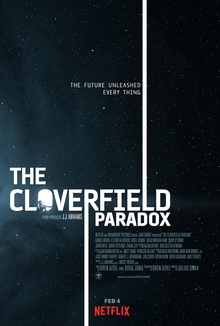For the last few months, there have been hints of a new movie in the Cloverfield universe with a working title of “The God Particle.” The film was originally not suspected to be part of the series until insiders leaked that there will be a connection to 2008’s “Cloverfield” and 2016’s “10 Cloverfield Lane.” However, as the release date for “The God Particle” crept up, there was little to no mention of the movie to be seen anywhere. No posters, commercials, TV appearances from actors, or anything. This led to quite the shock when during the Super Bowl, there was a TV spot for “The Cloverfield Paradox,” advertising it would be live on Netflix after the game!
This marketing tactic is genius; it caught viewers by surprise, rose word-of-mouth appeal, and made fans of the first two movies in the series very excited. This marketing technique and its success sets an exciting precedent for movies in the future, with the possibility for a new movie in an established franchise to just appear one morning. Unfortunately, the marketing technique is one of the few things the film gets right, and ultimately, the unique release strategy comes off as a bit of a ploy.
“The Cloverfield Paradox” is the third movie in a franchise of loosely connected movies. The first is, of course, the found footage monster movie that took the world by storm a decade ago. The second movie, “10 Cloverfield Lane,” has little to do with the monster from the first. Instead, it is a subdued and slow movie set in a basement while an alien invasion happens outside. Now, “Paradox” is being marketed as the missing link between the two movies, showing how they connect. However, it does not deliver on this promise. Instead, it delivers a confusing mess of a film with little to no actual world building and a contrived and unoriginal plot.
“Paradox” follows a group of scientists on the Internation Space Station as they try to use a particle accelerator to create renewable energy. The world below is on the brink of war, with the nations of the world in a cold war of trying to get electricity for their countries. After three years in space, the particle accelerator has failed every time. However, at the onset of the movie, it finally works and gets energy. Nevertheless, when the crew of the space station looks down toward Earth, it is gone. They have to use science to discover what is with the earth’s disappearance and how to get it back, all while weird things begin to happen on the Space Station.
Unfortunately, the movie gets nearly everything wrong. The script is weird and unoriginal, the characters are bland and all the same, the lighting is dark, and the cinematography boring, and the set design is uninspired and looks the same as any of the other science fiction movies coming out on the SyFy network.
The film has a myriad of problems, but the largest is that the movie simply does not need to exist. In a world where the “Aliens” franchise, “Event Horizon,” “Sunshine,” and “Gravity”
have all perfected the formula of ‘thriller/horror set on a single spaceship,’ “The Cloverfield Paradox” would need to bring something truly unique to the table. It utterly fails at originality in every way.
The film has one thing different from the other movies in its genre, and that is the alternate universe and dimension setting. However, the movie barely uses this. In the film’s script, the alternate universe might as well be a very far distance in the way that they handle it. All they do is turn a machine on to get back home, with next to no science of flair.
In a movie full of scientists, the characters are very stupid and do not seem to do much to make the audience believe that these are the best the entire planet has to offer. The characters take over half the movie to find out what the audience can figure out in the first few minutes, and the drama and squabbles in the film feel forced and unneeded. The characters don’t trust each other for no reason. It’s obvious the writers wanted to have an isolated setting style drama, such as John Carpenter’s “The Thing,” but it comes off forced and with little reason.
Another big offender is that the characters in the movie die seemingly for no rhyme or reason, with no obvious force fighting against them. No obvious evil force is killing the characters, and there is no embodiment for them to fight. In “Event Horizon,” the main antagonist is simply “Hell,” however, one of the main characters gets corrupted and becomes a monster, allowing for a movie with a metaphysical villain to have a physical representation on screen. This is meant to feel like the characters have something to fight, instead of it just being characters randomly dying to things that they have no control over. “Paradox” tries to do this with the betrayal by a character in the final few minutes, but this betrayal also comes off as random, with little motivation at all.
These problems are just the tip of the iceberg, with there being many more problems that, while minor, take away from the enjoyment of the film. However, looking at this, what went wrong? How did this high budget entry to a popular franchise come out so bad? The “Cloverfield” franchise is more of an anthology than a coherent point to point trilogy. When “10 Cloverfield Lane” was in production, it started as a movie completely unrelated. The studio has admitted that they knew the movie would be unappealing to the mass-market, and so they attached the “Cloverfield” title to the project for some free advertising. This worked in the film’s favor, as “10 Cloverfield Lane” released to critical acclaim. However, the studio tried the same thing with “Paradox,” a bad movie. The production studio wants their film to come out as best as possible, and even if they know it is bad, they want it to make them money. This is why it is a currently popular theory among film critics that the production studio realized “The God Particle” was a lousy movie and attached the Cloverfield connections to make it more appealing. Without these connections and marketing scheme, next to nobody would watch the movie. They attached the title and dumped straight to Netflix, as they might have projected the movie wouldn’t do well in theaters.
This brings up the movie’s absolute greatest flaw: the fact that it started as “The God Particle,” and then had reshoots to add in some scenes to make the “Cloverfield” connection
obvious. The scenes they added in post-production are apparent, and the ending, in particular, is one of the most infuriating things in cinema in years.
In conclusion, it is unfortunate that this movie stains the previous two in the series. “Cloverfield” and “10 Cloverfield Lane” are amazing, with the latter particularly being an above average science fiction movie. However, at the end of the day, “Paradox” adds nothing to the series, and adds nothing to Netflix’s catalog. The movie does not invent anything new for the genre and is not even the best science fiction release this year. In a world with yearly seasons of “Black Mirror,” a science fiction movie truly needs to be special to stand out, and “Paradox” does not even come close.
Rating: 1 out of 5 paws.





